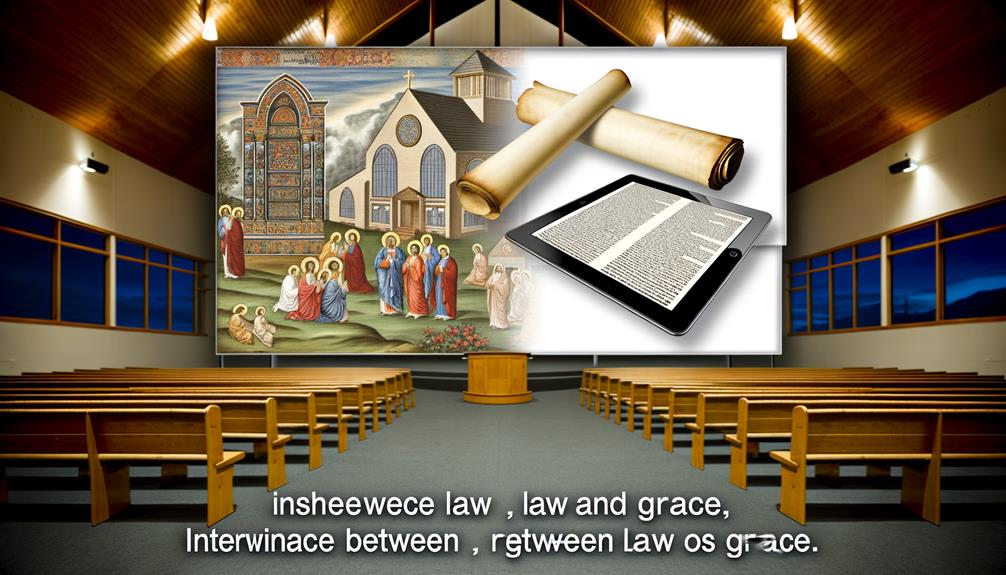Meaning of Antinomianism in the Bible: Grace vs. Law
Antinomianism in the Bible refers to the belief that faith alone is sufficient for salvation, separating itself from the necessity of adherence to Mosaic Law. This term, originating from the Greek words ‘anti’ (against) and ‘nomos’ (law), has roots in Pauline theology, particularly in Romans and Galatians, where Paul emphasizes justification by faith and living under grace.
This perspective highlights a transformative relationship with God that is internal and grace-driven, rather than external and law-bound. Addressing the balance between law and grace, and its implications on ethical living, provides deeper insight into this complex theological stance.

Antinomianism in the Bible: Meaning, Heresy, and Theological Impact
| Aspect | Meaning |
|---|---|
| Term | Antinomianism |
| Definition | Belief that Christians are not bound by moral law under the gospel |
| Biblical Warning | Romans 6:1–2 – “Shall we continue in sin, that grace may abound?” |
| Theological View | Considered a heresy by mainstream Christian teachings |
| Spiritual Consequences | Leads to moral laxity and undermines the call to holiness |
| Faith Insight | True grace leads to transformation, not lawlessness |
Historical Background

The historical background of antinomianism in the Bible is rooted in early Christian debates regarding the relationship between Mosaic Law and the new covenant established through Jesus Christ. These discussions emerged prominently in the first century, as the nascent Christian community sought to define its identity distinct from Judaism.
The term ‘antinomianism’ itself derives from the Greek ‘anti’ (against) and ‘nomos’ (law), reflecting a theological position that questions the binding nature of the Mosaic Law for Christians.
Early theologians, such as Paul, grappled with whether salvation and moral conduct should be governed by adherence to the Law or by faith and grace alone.
This dialectic shaped foundational Christian doctrines, influencing interpretations of law, grace, and ethical living within the faith.
Key Biblical Passages

In examining the concept of antinomianism, key biblical passages offer critical insights into its theological implications.
Romans emphasizes the transformative power of grace, while Galatians addresses the tension between law and faith. James underscores the essential role of works in the believer’s life.
Each of these texts provides a nuanced perspective that contributes to understanding the broader biblical stance on law and grace.
Romans and Grace
Romans provides a foundational exploration of grace, particularly in passages such as Romans 3:24 and Romans 6:14, which underscore the transformative power of divine grace in the believer’s life.
Romans 3:24 articulates that believers are ‘justified freely by His grace through the redemption that is in Christ Jesus,’ highlighting the unmerited nature of grace as a divine gift.
Romans 6:14 further clarifies that believers are ‘not under law, but under grace,’ indicating a change from the Mosaic Law to a grace-centered paradigm.
This theological alteration elucidates how grace functions not merely as a pardon but as an empowering force, transforming believers’ lives and enabling them to live in accordance with God’s will, free from the dominion of sin.
Galatians and Law
Galatians addresses the complex relationship between law and grace, particularly emphasizing the insufficiency of the Mosaic Law for justification and the necessity of faith in Christ.
Paul’s epistle articulates that the law served as a ‘guardian‘ until Christ came (Galatians 3:24-25), highlighting its temporary and preparatory role. He vehemently argues that reliance on legalistic practices undermines the essence of the gospel (Galatians 5:4).
Theologically, Galatians stresses that true freedom and sonship in God are attained through faith rather than adherence to the law (Galatians 3:26). This epistle challenges believers to embrace a faith that manifests through love, rather than through obligatory observance of the law, hence underscoring the transformative power of grace over legalism.
James and Works
While Paul emphasizes justification by faith apart from the law in Galatians, the Epistle of James contends that faith without works is dead, consequently presenting a balanced view on the role of deeds in the life of a believer.
James 2:14-26 serves as the cornerstone for this argument, underscoring that genuine faith results in tangible actions.
The theological tension between Paul and James is not contradictory but complementary. Paul addresses the root of salvation—faith—while James focuses on its fruit—works.
This nuanced relationship highlights that authentic faith inherently produces good works, countering antinomian tendencies that dismiss the necessity of moral conduct.
Consequently, James deeply enriches the biblical discourse on faith and works, advocating for an integrated faith that manifests in ethical living.
Paul’s Teachings

Paul’s teachings on antinomianism are pivotal in understanding early Christian thought concerning the relationship between faith and the Law. His epistles, particularly Romans and Galatians, address the tension between Jewish legalism and the newfound Christian liberty.
Paul articulates that salvation is achieved through faith in Jesus Christ rather than adherence to the Mosaic Law. This theological stance can be summarized through:
- Justification by Faith: Paul underscores that righteousness is imputed by faith, not by law-keeping.
- Freedom in Christ: Believers are liberated from the Law’s constraints, living under the guidance of the Spirit.
Paul’s nuanced argumentation shaped foundational Christian doctrine, emphasizing grace over legalistic observance.
Grace Vs. Law

The theological tension between grace and law is a significant theme in understanding antinomianism within the biblical context.
While grace is often seen as the unmerited favor bestowed upon believers, the law serves as a moral compass and covenantal framework.
Analyzing how these elements interrelate is essential for comprehending the balance between divine mercy and ethical obligation in Christian doctrine.
Interpreting Biblical Grace
Understanding the interplay between grace and law is pivotal for a thorough theological analysis of antinomianism within the biblical narrative.
Biblical grace, as discussed in the New Covenant, emphasizes God’s unmerited favor towards humanity, contrasting with the Old Covenant’s legalistic adherence. This dichotomy raises essential questions within Christian theology:
- Redemption: Grace signifies the unearned salvation through Jesus Christ, transcending the law’s requirements.
- Transformation: Grace leads to an inward renewal, fostering adherence to God’s will beyond mere legal obedience.
Thus, understanding these dimensions helps elucidate how grace redefines the believer’s relationship with divine law, a core issue in antinomian discourse.
Law’s Role Explained
In examining the role of the law within the framework of grace, one must critically assess how the Mosaic Law functions in light of the transformative power of grace in the New Covenant.
Theologically, the Mosaic Law served as a tutor leading to Christ, revealing humanity’s inability to attain righteousness through works alone. Grace, introduced through Christ, does not abolish the law but fulfills its righteous requirements on our behalf.
Contextually, the law highlights the moral and ethical standards of God, while grace provides the means for internal transformation and empowerment to live according to these standards. Consequently, the law’s role is not rendered obsolete but is redefined and completed through the grace bestowed by Christ’s redemptive work.
Balancing Grace and Law
Steering the intricate relationship between grace and law requires a nuanced understanding of their complementary roles within the framework of Christian theology.
Grace, embodied in the sacrificial love of Christ, provides the foundation for salvation, while the law, given through Moses, delineates moral and ethical standards. The Apostle Paul addresses this balance, emphasizing that grace does not nullify the law but fulfills it.
- Pauline Doctrine: Paul teaches that believers are justified by faith, not by works of the law, yet the law guides moral conduct.
- Jesus’ Teaching: Jesus upholds the law, asserting that He came not to abolish it but to fulfill it through grace.
The Role of Faith

Central to the concept of antinomianism within the biblical context is the theological assertion that faith alone, rather than adherence to the law, is sufficient for salvation.
This perspective finds its roots in Pauline theology, particularly in the epistles to the Romans and Galatians, where the Apostle Paul emphasizes justification by faith apart from works of the law.
Antinomianism posits that the grace bestowed through faith in Christ supersedes the Mosaic Law, thereby liberating believers from its legalistic constraints.
The theological implications of this stance underscore a transformative relationship with God, driven by internal faith rather than external compliance.
Consequently, faith is not merely an intellectual assent but a profound, relational trust in divine grace and mercy.
Criticisms of Antinomianism

Although antinomianism asserts the sufficiency of faith for salvation, it has faced significant theological criticisms for potentially undermining moral accountability and the ethical teachings of the Bible.
Critics argue that antinomianism can lead to:
- Moral relativism: Without adherence to the Law, individuals might justify unethical behaviors under the guise of faith.
- Neglect of sanctification: The process of becoming more Christ-like may be disregarded, contradicting scriptural exhortations for holy living.
Analyzing these critiques highlights the tension between faith and works, emphasizing the importance of balancing doctrinal beliefs with ethical imperatives in Christian theology.
Antinomianism in Church History

Throughout church history, antinomianism has emerged at various times, prompting significant theological debates and shaping the contours of Christian doctrine and practice.
In the early church, figures like Marcion rejected the Old Covenant law, advocating a radical separation from Jewish traditions.
During the Reformation, Martin Luther‘s emphasis on salvation by faith alone inadvertently gave rise to antinomian tendencies, as seen in the teachings of Johann Agricola.
The Puritans also grappled with antinomianism, particularly through the controversy surrounding Anne Hutchinson in the Massachusetts Bay Colony.
Each historical episode underscores the tension between grace and obedience, revealing how antinomianism challenges the church to continually refine its understanding of the relationship between law and gospel.
Modern Perspectives

In contemporary theology, antinomianism continues to provoke critical examination, particularly as modern interpretations of grace and law intersect with evolving cultural and ethical paradigms. Scholars debate whether antinomian tendencies undermine moral responsibilities or reflect a profound understanding of divine grace. This discourse is shaped by various theological and cultural dynamics:
- Grace vs. Law: Some theologians argue that an overemphasis on grace can lead to moral laxity, while others view it as the ultimate expression of Christian freedom.
- Cultural Relativism: The rise of postmodern thought challenges traditional moral absolutes, creating a nuanced landscape for antinomian discussions.
- Ethical Implications: Contemporary ethical issues, such as social justice and personal autonomy, are often examined through the lens of antinomian principles.
These perspectives underscore the enduring complexity of antinomianism in modern theology.
Conclusion
In sum, the exploration of antinomianism within biblical and historical contexts reveals a complex interplay between grace and law, faith and obedience.
By examining Pauline epistles and subsequent theological discourse, it becomes evident that the tension between liberty in Christ and ethical mandates persists.
The antinomian controversy, reminiscent of the ancient Marcionite debates, continues to provoke reflection on the essence of Christian freedom and the enduring relevance of divine commandments in shaping moral conduct.






